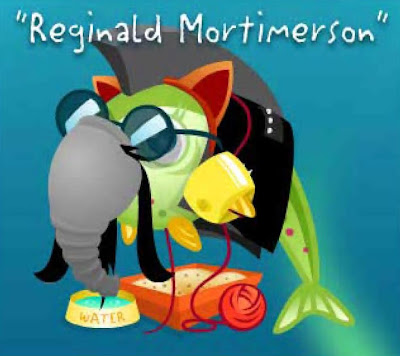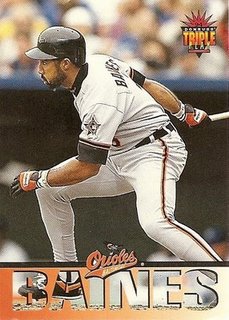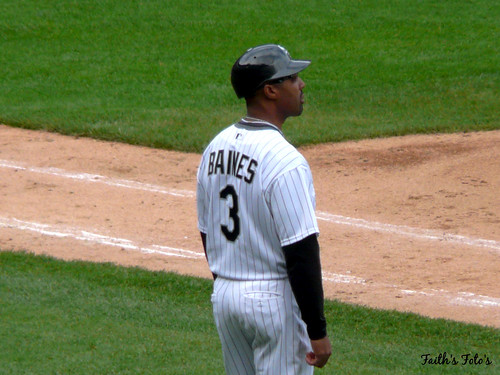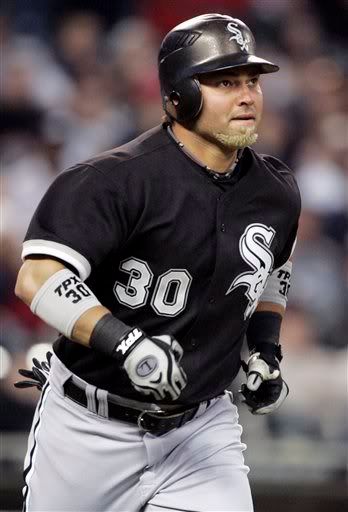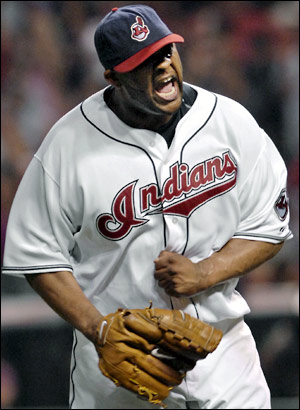
I had been away from blogging for a few weeks as my wife and I were finalizing the adoption of our son, but there's nothing like the biggest name in baseball on the biggest team being implicated in yet another scandal to bring one back to the fore.
As you've no doubt heard by now, Alex Rodriguez had a rough week. First he had to deal with the overblown allegations from Joe Torre's book about how his teammates referred to him as "A-Fraud" (though Torre maintains that they did so in jest). Then Madonna dumps him for some Brazilian model/boy-toy. And then someone leaks his name in connection with a failed drug test from 2003.
Regarding the Leak:
We knew that a bunch of guys had failed tests in 2003, back when MLB and the Players' Union were just "surveying" to help decide whether they needed a full-blown drug testing program, mostly to keep congress of their backs. According to the Mitchell Report,
"1,369 tests were conducted in 2003, and 96 of those tests were positive for steroids. Although 13 of the 96 positives were disputed by the Players Association, the disputes were never resolved because the positive rate was above the 5% threshold under either calculation. " (p. 55)That 96 is not the 104 number we've heard thrown around this week, but it's close enough. As I've said in the past, if the players were aware that they were to be tested, were often tipped off as to when the tests would occur and they still couldn't avoid the 5% threshold, then how many of them were really using? It's a heck of a lot more than 5-7%, I'll tell you that.
The names of those who tested positive in 2003 were never supposed to be made public, as they were supposedly only for survey purposes, and some people think heads should roll for the failure to destroy that information in a timely fashion. Shysterball thinks that someone in the US prosecutor's office leaked the info to somehow put pressure on the judge in the Barry Bonds case, or something, which doesn't totally make sense to me, but then he's a lawyer and I'm not.
In any case, we'll probably never know the identities of the other 100 or so names on that list, nor should we. They were supposed to be anonymous, and nobody gave a damn about them until now. Certainly, justice would be served if A-Rod had some company in that spotlight, as he's clearly only about 1% of the guilty parties from that group. But the Players' Union is not in the habit of surrendering anything they haven't already lost, and for now, they haven't lost those other 100 or so names, so you can't have them. So there.
A-Rod's "Apology":
In some ways, his decision to come out and admit that he used steroids seems kind of refreshing. After all, at this point, these were just rumors, and to date Alex Rodriguez is the only baseball player who has come out and admitted to more than that of which he was accused.
Jason Giambi apologized for, well, nothing in particular. Rafael Palmiero and Barry Bonds and others have denied any wrongdoing in spite of the preponderance to the contrary. Andy Pettitte apologized, but admitted to only using HGH once or twice, and then only to heal faster, not to gain some kind of edge (as though getting back on the playing field sooner is not some kind of edge?). Nobody else of any significance has yet admitted to or apologized for several years of PED usage when the only evidence against them was one failed test.
So it's nice to see someone step up and be a man, for once. But on the other hand, how big a man is he? His confession entails using only from 2001-2003, before there was a testing policy in the major leagues, indeed, before there was any mutually agreed upon prohibition on performance enhancing drugs at all.
This is like admitting that you once hunted and shot a leopard in 1968, before they were on the endangered species list. It may not have been a nice thing to do, but it wasn't illegal, and you obviously did it on purpose and were therefore clearly not sorry for it at the time. But now that everyone knows and it's a bad PR move to have been a leopard hunter once upon a time, well, now you're sorry.
Additionally, it seems that A-Rod's confession is probably scripted and incomplete, at best. Rob Neyer points out some of the faults with it, including where he thinks A-Rod loses the script and where he gives a somewhat less than definitive response as to when he used PEDs. He definitely gives the impression that he's being less than forthright here.
It's a very convenient confession, don't you think? It explains his steroid use as a response to the intense pressure he felt upon signing what was then the largest contract in sports history. That's a lot of pressure, and it makes sense, and we can all imagine ourselves doing the same thing, right? breaking some implied but essentially nonexistent rules to help ourselves get better at what we do, thereby justifying the huge contract and saving off the boos and jeers? I can relate to that.
It also isolates his steroid use to his three seasons as a Texas Ranger, which means he has to piss off only one location to make his apology (albeit one that uses the death penalty somewhat liberally...I'm just sayin'). Specifically, it isolates his drug use to three seasons in which his team won absolutely nothing, finishing in 4th place all three years. The only things tainted by his admission were the awards he personally won during those three years, and of course he has more where they came from. He can deal with that.
But the good people of the greater Northwest can rest easy knowing that Rodriguez really was as talented as he seemed when he played for the mariners from 1994-2000. The good people of New York can have some assurance that the two MVP awards he's won in Yankee Pinstripes are legit. And the whole of the baseball-watching world can take some solace in the "fact" that he's not using anything anymore.
Or is he?
Let me ask you this: If A-Rod was not using steroids in Seattle, but he was in Texas, wouldn't you expect to see some evidence of that? He left Seattle when he was 25 at an age where he should have been entering his natural peak, typically 26-28 or so. But his slugging, batting average, OBP and OPS were almost totally consistent between his last year in Seattle and his three years in Texas. Take a look:
YEAR AGE AVG OBP SLG OPS
2000 25 .316 .420 .606 1.026
2001 26 .318 .399 .622 1.021
2002 27 .300 .392 .623 1.015
2003 28 .298 .396 .600 .996
Avg. .308 .402 .613 1.015
Std Dev .010 .013 .012 .013
He loses 21 points of OBP. OK, whatever. He gains it back with 16 points of Slugging, which is basically the difference between Arlington and Safeco for 2001. The next year he holds steady with the slugging but loses a few points of batting average and OBP. In 2003, the year when he turned 28, and also the year in which we already know he was cheating, he again loses a couple of points of batting average and drops 23 points of slugging.
I don't mean to make too much of the individual statistics here. These are all well within the normal range of what you would expect for a great player entering his prime. But that's the problem. You would have expected to see a big jump in his performance, or at least in his stats, when he went to Texas. But instead of skyrocketing, he plateaued. With all those factors working in his favor, there are really only two logical explanations for this:
1) He stopped working so hard, but the ballpark and the 'roids compensated for this.
B) He didn't just start using PEDs when he went to Texas.
You can guess where I'm putting my money. For the record, by all account Alex Rodriguez works as hard or harder than anybody out there, and always has. Nobody has ever accused him of laziness or a lackadaisical attitude. So that ain't it.
I don't know when he started using PED's, but it wasn't in 2001. Maybe it was 1998, when he was coming off a sub-par season and admitted HGH user David Segui joined the Mariners. Others implicated in (or at least smeared by) the Mitchell Report who also played with Rodriguez in Seattle include Josias Manzanillo, Glenallen Hill and David Bell, his double play partner in 1998, 1999 and 2000.
Maybe it was 1999, when he missed 30+ games due to knee surgery, and he wanted to get back in shape fast. Maybe it was 2000, when his adjusted OPS jumped from 134 to 162 after an injury plagues 1999 season. In any case, other than it own, apparently well-crafted confession, there's little evidence to suggest his PED usage started when he went to the Rangers.

A-Rod's Legacy:
As big a story as this is right now, frankly, I doubt it will mean much in the long run. You see, the more we learn about the PED Era, the more guilty parties there seem to be, and the more people there were using, the less seriously we can consider the pundits who believe that all the juicers' records should be expunged, or at least ignored.
If juiced-up pitchers were facing juiced up hitters, almost all the time, should we penalize them both? Shouldn't the better players still get credit for their accomplishments? You can argue that Barry Bonds wasn't Better than hank Aaron, if you want, but there's no question that Barry Bonds was better than anybody else who played during his career.
Over time, the list of players who have been caught will only grow, and the amount of innuendo and rumor linking others to the PED Era will call everyone into question. A-Rod, Bonds, Palmiero, Roger Clemens, Mark McGwire, Juan Gonzalez, Miguel Tejada, Gary Sheffield, Jason Giambi, Ken Caminiti, Ivan Rodriguez, Andy Pettitte, Jose Canseco, Mo Vaughn...the list of connected players is ridiculously long, and there are bound to be others.
Even - and I hate to say it - Albert Pujols may someday find his name sullied by this scandal. It was his trainer, you'll recall, who sold Jason Grimsley his HGH. And of course, there's no shortage of nobodies on the list either. Mike Judd, Adam Piatt, Tim Laker, Ryan Jorgensen, Stephen Randolph, Bart Miadich, and a couple of hundred more.
Literally nobody is safe from the speculation, and that means that virtually everybody could have been using PED's in the late 1990's and early 2000's. Perhaps it's time we started asking not who was using, but who wasn't?

